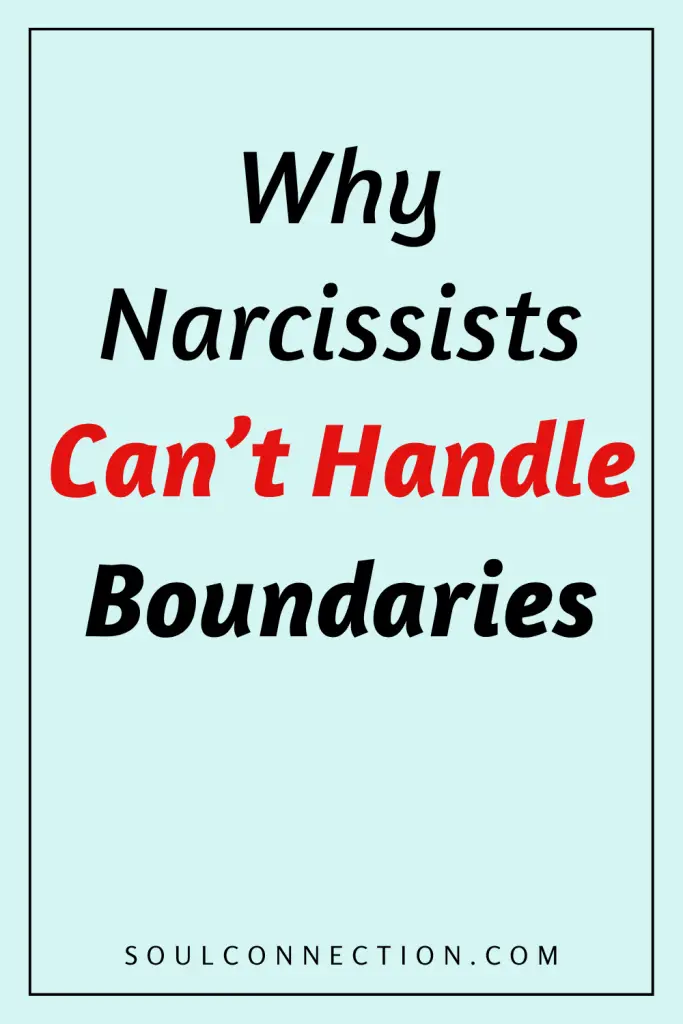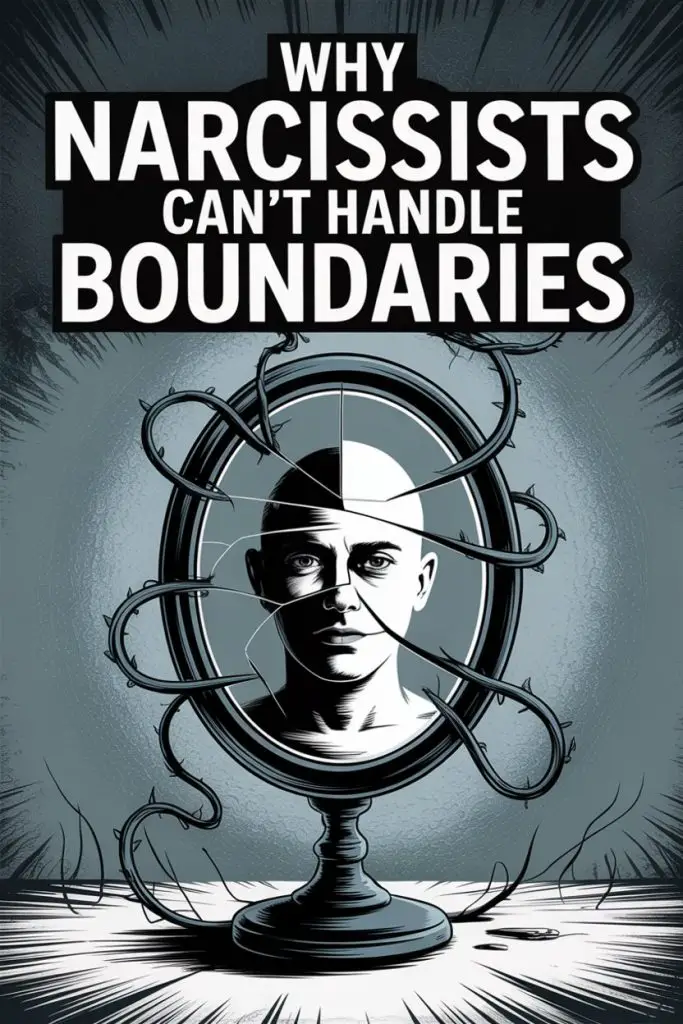Ever tried telling a narcissist “no”? You may as well have challenged them to a duel at dawn. Boundaries—those invisible fences that keep relationships safe and respectful—are kryptonite to the narcissist’s ego.
If you’ve ever found yourself feeling guilty for sticking up for yourself, or wondering why your simplest requests seem to spark fireworks, you’re not alone. Narcissists and boundaries go together about as well as cats and bathtubs.
Let’s unravel why these folks seem to treat your boundaries like personal insults and what you can actually do when your emotional fence posts keep getting trampled.
Boundaries Are Like Garlic to a Vampire
Healthy people see boundaries as no big deal—just basic rules for dignity and sanity. To a narcissist, though, boundaries are a personal affront.
Why? Deep down, their world revolves around feeling special, powerful, and above the rules.
Boundaries say, “You’re just another human, like everyone else. You don’t get a special pass.” That message doesn’t land well.
Narcissists thrive on control—whether that’s steering conversations, choosing the restaurant every time, or dictating how you spend your Saturday afternoons. Boundaries yank the steering wheel from their hands. Cue meltdown.
The “How Dare You?” Response
Ever noticed how a simple request—“Please don’t read my texts”—can unleash a storm with a narcissist? Setting a boundary is often met with outrage or mockery.
Sometimes they’ll act wounded, turning on the crocodile tears, or they’ll go full-on rage mode, accusing you of being selfish or “cold.”
Why the drama? Narcissists see boundaries not as guidelines, but as threats to their sense of superiority. If they’re not in charge, they feel exposed and powerless.
It’s not just about wanting their way—it’s about needing to feel like the most important person in the room.
Boundary-Testing in Action
Maybe you’ve established a rule for your own well-being: “I need some time alone this weekend.” Suddenly, your phone lights up with 17 texts, each more guilt-trippy than the last.
Or they “forget” your request and show up unannounced, acting as though you invited them. A narcissist will poke and prod at your boundaries like a toddler testing bedtime limits.
This isn’t forgetfulness. It’s an intentional push: Will you hold the line, or will you fold? Each time you cave, they learn that your boundaries are more like suggestions.
The Guilt Boomerang
Ever walked away from a conversation with a narcissist feeling like you’re the one in the wrong—even when you were just asking for basic respect? Welcome to the guilt boomerang.
Narcissists are experts at flipping the script. When you assert a boundary, suddenly you’re accused of being unloving, unreasonable, or “too sensitive.”
It’s emotional sleight of hand: you find yourself backpedaling, apologizing for having needs.
Here’s a secret: people who love and respect you won’t punish you for needing space, privacy, or respect. If you’re always on the backfoot, it’s not you—it’s the boundary-busting antics.
Control Is the Name of the Game
Peel back the layers, and you’ll find that narcissists’ aversion to boundaries boils down to a need for control. They want to call the shots, decide the rules, and set the pace. Boundaries get in the way of this plan.
It’s not that they can’t understand your needs. They just don’t want to accommodate them if it means they’ll lose their grip. Any pushback is seen as a threat to their carefully constructed world.
Why Boundaries Trigger Narcissistic Injury
If you follow pop-psychology, you’ve probably heard the term “narcissistic injury.” This is what happens when someone (like you) pokes a hole in a narcissist’s inflated self-image.
Even the smallest boundary can feel like a full-on betrayal. The reaction? Defensive maneuvers—anger, sulking, silent treatment, or even revenge.
For a narcissist, boundaries are reminders that they aren’t the center of the universe. That stings. Rather than pause and reflect, they double down, either lashing out or withdrawing love and attention.
Escalation: When Boundaries Backfire
Some folks think that if they just explain their boundaries gently enough, a narcissist will come around. If only! Often, the more you assert yourself, the more extreme the narcissist’s reactions become.
Maybe you set a limit on late-night texts, and suddenly you’re being love-bombed (“You’re my soulmate; how could you do this to me?”). Or, on the flip side, they go cold, acting like you don’t exist.
It’s all about punishing you for daring to have needs.
Gaslighting: The Boundary-Buster’s Ace Card
You say, “Please don’t interrupt me.” Suddenly, you’re being told you’re too sensitive, or you “misunderstood” what happened. Maybe you start questioning your own reality.
Gaslighting is a favorite tactic of narcissists facing boundaries. If they can convince you that you’re overreacting or imagining things, your boundaries don’t just erode—they disappear completely.
Suddenly, their version of events seems more plausible, and yours feels shaky.
Why Apologies Rarely Stick
Ever received one of those apologies that felt more like a dig than an actual “I’m sorry”? Narcissists might throw out a “Sorry you feel that way” after a boundary dispute. Real remorse? Not so much.
That’s because genuine apologies require self-reflection and empathy, which are not a narcissist’s strong suits. They’re more interested in keeping the peace (or the upper hand) than actually understanding why your boundary matters.
Setting Boundaries with a Narcissist Without Losing Your Mind
Here’s the million-dollar question: Is it even possible to keep your boundaries when a narcissist is determined to bulldoze right through them? It’s tough, but not impossible.
- Keep boundaries clear and simple. Don’t get bogged down in lengthy explanations. “I can’t talk right now” beats “Here are the 14 reasons I’m busy.”
- Enforce, don’t just announce. If you say you need space, actually take it—even if there’s drama. Consistency is crucial.
- Skip the debate. Narcissists love to argue the rules. Don’t take the bait. A broken record approach (“I’m not available”) works wonders.
- Watch your guilt. Their feelings aren’t your responsibility. It’s not cruel to protect your peace.
- Limit expectations. Waiting for genuine understanding or change is like waiting for rain in the desert—focus on your own boundaries, not their approval.
- Seek support. Boundaries are easier to hold when you have a cheer squad. Lean on friends, family, or a therapist.
When Boundaries Mean Goodbye
Sometimes, the only way to protect your boundaries is to put real distance between yourself and the narcissist—emotionally, or if needed, physically. This isn’t failure; it’s self-respect.
If you’re met with endless pushback, manipulation, or emotional whiplash, it might be time to re-evaluate what you’re willing to tolerate. If a partner, parent, or friend just can’t respect your limits, no amount of negotiation will change them.
Walking away can be the strongest boundary of all.
Why Holding Boundaries Matters (Even When It’s Hard)
Boundaries aren’t just for keeping out toxicity. They’re for building healthy, loving connections—with yourself and others. Even when a narcissist scoffs or storms out, holding firm is an act of self-care.
Each time you assert a need, you reinforce your sense of self-worth. You teach the world (and yourself) that your feelings matter. That’s the opposite of narcissism—and the foundation of every good relationship.
Building Your Emotional Fence
Narcissists may never thank you for having boundaries, but your future self will. Fences aren’t just for keeping people out; they’re for keeping you safe and sane.
Next time your boundaries are met with fireworks, remember: it’s not a sign you’re doing something wrong. If anything, it’s proof you’re doing something right.
Healthy love isn’t threatened by boundaries—it’s built on them.


